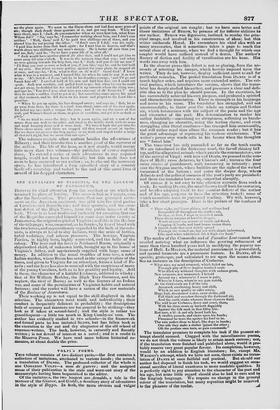THE CAVALIERS OF vinottaza, OR THE RECLUSE OF JA E
S T 0 N,
DERIVES its chief attraction from the accident or art which de- termined its place of locality. The scone is laid in Virginia, soon after the Restoration. That province, then our principal settle- ment on the American coatinent, was split ieto the rival parties of Cavaliers and Reundheads; and their quarrels, and the even- tual defeat of the High Tories, form the public inteecst of the book. There is at least traditional authority for asserting that one of the Regicides concealed himself ibr some time in the irinity of Jamestown, the original capital of Virginia ; and this is the Recluse of the titlepage ; who, connected, as he faneiee, by ties of blood with the two lovers, and superstitiously regarded by the bulk of the colo- nists, is always at heed to slay Indians, turn the scale of battles, forbid weddings, and release prisoners. The heroine, Virginia Fairfax, is highly born, highly connected, and the belle of the colony. The hero and the lover is Nathaniel Bacon, originally a shipwrecked child, of unknown birth, brought up in the house of Virginia's father, and mysteriously supplied with large sums of money. In addition to the usual troubles of true love, a noble Indian maiden, whom Bacon has saved in the savage warfare of the times, and given to Virginia for an attendant, forms a kind of Pe- ndia ; and the hero has also to contend with the suspicions of many of the young Cavaliers, both as to his gentility and loyalty. Add to these, the character of a faithful Irishman, addicted to whisky; that of Sir William Berkley, the High Tory Governor, and his nephew, the rival of Bacon; as well as the horrors of an Indian war, and some of the peculiarities of Virginian habits and natural features; and the reader will have a notion of the raw materials of the Recluse of Jamestown.
Their working up is not equal to the skill displayed in their 'selection. The characters want truth and individuality ; their ,conduct is frequently deficient in probability ; the descriptions both of scenery and manners are too general to be striking—they look as if taken at second-hand ; and the style is rather too grandiloquent—a little too much in King Cambyses' vein. The author has evidently studied in two schools—in the framework and formal parts he has imitated SCOTT, but has fallen back in the execution to the cut and dry eloquence of the old school of romance-writers. The book, however, is earnestly and fluently Written; is not devoid of interest as a novel ; and is a credit to the Minerva Press. We have read more tedious historical ro- enances, at about double the price.


























 Previous page
Previous page